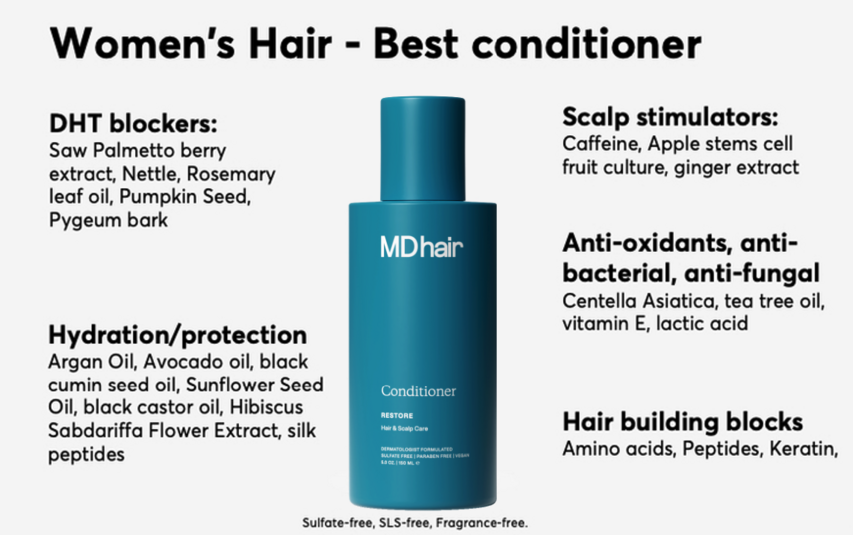Best conditioner for people with hair loss

If you're dealing with hair loss, you may wish to add a specially formulated conditioner to your hair care routine. You'll want to make sure you're picking a conditioner with ingredients that have been proven to be effective. Here is everything you need to know before purchasing a conditioner for hair loss.
How do hair loss conditioners work?
These conditioners can help with thinning hair in various ways. Well-formulated hair loss conditioners contain ingredients that stimulate hair follicles to promote hair growth while supporting scalp health. These products are also excellent for hydrating and strengthening the hair to prevent breakage and promote healthy hair.
Some products have better, more targeted ingredients than others. It's essential to look at the ingredient label to ensure the conditioner you're interested in contains effective ingredients!
What ingredients should you look for?
When looking for a conditioner for hair loss, there are a few ingredients you should keep an eye out for. The essential ingredients boost hair growth, strengthen and prevent breakage, nourish and hydrate, and promote healthy hair.
Peptides and Amino Acids
Amino acids and peptides (chains of amino acids) are the building blocks of our hair. Research has indicated that when applied topically, amino acids can strengthen the hair and fight against damage. Alanine, phenylalanine, and arginine are a few of the amino acids you'll typically see in hair products.
Caffeine
If you've looked at the ingredient labels of hair growth products, you've probably spotted caffeine at least a few times! Caffeine is one of the best ingredients for hair loss, as it can encourage blood flow to support the hair follicles and promote healthy hair growth and stronger hair.
DHT Blockers
DHT blockers are ingredients that block an androgen called dihydrotestosterone (DHT) from binding to hair follicles – an action that inhibits growth. Ketoconazole, pumpkin seed oil, and saw palmetto are some of the most effective DHT blockers in hair care products.
It's important to note that not every hair loss is caused by DHT, and those who aren't affected by this androgen won't benefit from using DHT blockers. If you aren't sure if DHT is your main trigger, it's wise to talk to a medical professional before investing in a product with these blockers.
Essential Oils
Essential oils are frequently used as natural ingredients in hair products, and they can offer more benefits than just making the formula smell nice. Peppermint and rosemary essential oils have both been linked with promoting hair regrowth, while tea tree oil has been shown to help support a healthy scalp.
Nourishing Oils
Certain oils rich in antioxidants and fatty acids help moisturize dry hair, nourish it, and protect it from damage, which can indirectly help fight hair loss. Argan oil, castor oil, coconut oil, and jojoba oil are excellent moisturizing ingredients to look for in a conditioner.
Silk Protein
Hydrolyzed silk is commonly used in volumizing and strengthening hair products – particularly for hair types that are dry and/or damaged. It doesn't directly promote hair growth but can prevent breakage and increase moisture retention for better hydration in dry strands.
Keratin
Keratin is a protective protein naturally present in hair, skin, and nails. Research has shown that it helps promote stronger hair, making it less likely to experience breakage. Used in a shampoo or conditioner, it can make hair smoother, reduce frizz, and minimize split ends.
Aloe
While aloe isn't directly linked to promoting growth, it can nourish overall hair health. Aloe contains various vitamins that strengthen hair strands, including vitamins A, B12, C, and E.
What is the best pH level for a hair regrowth conditioner?
The best pH range for regrowth hair products is between 5 and 6, closest to the scalp's pH. pH-balanced (<5.5) hair products help reduce hair dryness, frizz, breakage, and split ends. Products with alkaline pH cause the hair cuticle to have higher porosity and more brittle, dry, and frizzy hair.
pH is a measure of the acidity or basicity of a solution. A solution with a pH lower than 7 is considered acidic, and a solution with a pH greater than 7 is considered essential or alkaline. Our hair has an acidic pH (5.5) and will react much better to slightly acidic products. Alkaline or basic pH shampoos and conditioners cause the hair to swell and the cuticles to open - increasing the hair's porosity, frizz, and dryness. Alkaline shampoos will also increase the hair fiber surface's negative electrical charge, increasing the fibers' friction. This may lead to cuticle damage and fiber breakage. Shampoos with an acidic, lower pH will close the cuticle, reduce hair porosity, and generate less negative static electricity on the fiber surface, reducing hair dryness and frizz.
MDhair's products are pH-balanced. The pH of the MDhair Restore Shampoo is 5.16, the conditioner has a pH of 5.6, the pH of the Restore Serum is 5.3, and the MDhair Minoxidil pH is 3.
How do you use a hair loss conditioner?
Using a hair loss conditioner shouldn't look too different from using a traditional one. That said, you can do a few things to maximize its effectiveness. Most importantly, use your conditioner every time you wash your hair. Consistency will get you the best results.
When you apply, work the product throughout your hair, from the scalp to the ends. You must use the conditioner on your scalp since many of the beneficial ingredients in hair loss products work in the hair follicles. You'll also want to ensure you leave the conditioner on your hair for several minutes, as this will allow the formula to work its magic fully.
Additional tips for people with hair loss
While a high-quality conditioner can help strengthen the hair and combat hair loss, you'll want a multi-faceted approach to tackling your thinning hair. For the best results, lather up with a hair loss shampoo alongside your conditioner to maximize your benefits while washing your hair. For many people, the best shampoo for hair loss will contain DHT blockers, but this will depend on your specific needs.
As you're actively dealing with hair loss, you'll also want to be as gentle with your hair as possible while it regains strength. Limit the amount of heat styling you do (and use a heat-protectant product if you must). You should also avoid coloring your hair, as color-treated hair tends to be weaker.
It's also wise to talk to a dermatologist about other hair loss treatments that suit your specific needs. If you aren't sure what is causing your hair loss, they can help pinpoint the trigger to help address the root cause.
Various factors can lead to hair loss, including traumatic events (physical or emotional), regularly wearing tight updos, pregnancy, diet, chronic illnesses, and more. A medical professional can help you determine what's causing your thinning hair and create an action plan to achieve healthy hair.
Shop:
MDhair's award-winning Restore Shampoo
References:
- Feather keratin hydrolysates obtained from microbial keratinases: effect on the hair fiber
- Differential effects of caffeine on hair shaft elongation, matrix, and outer root sheath keratinocyte proliferation, and transforming growth factor-β2/insulin-like growth factor-1-mediated regulation of the hair cycle in male and female human hair follicles in vitro
- Replenishing amino acids in damaged hair
- Rosemary oil vs. minoxidil 2% for the treatment of androgenetic alopecia: a randomized comparative trial
- Peppermint Oil Promotes Hair Growth without Toxic Signs
Find the most effective hair growth products for you by taking the free hair assessment.




